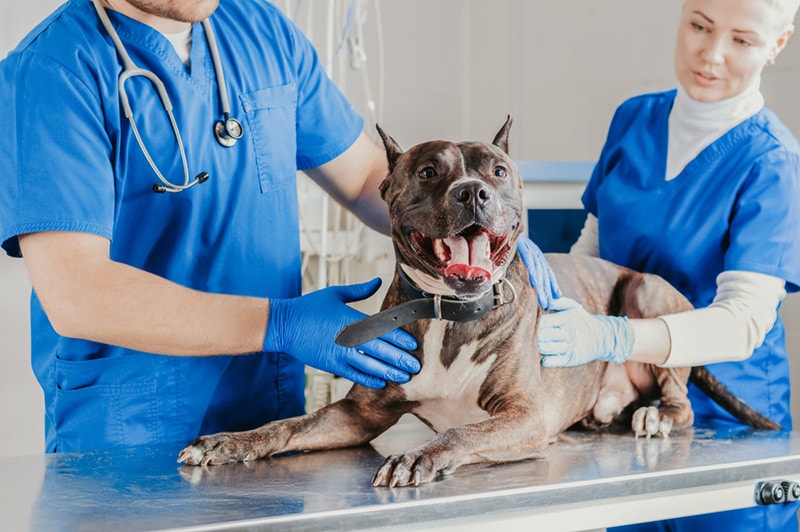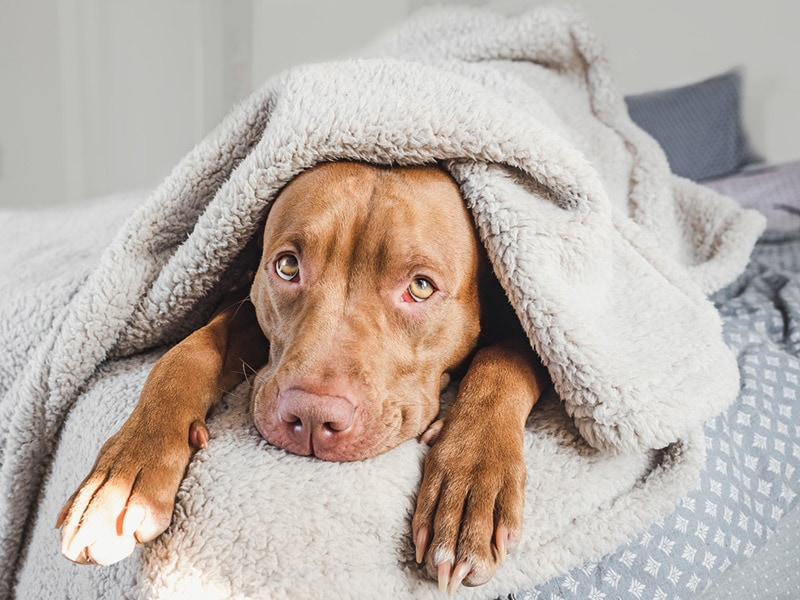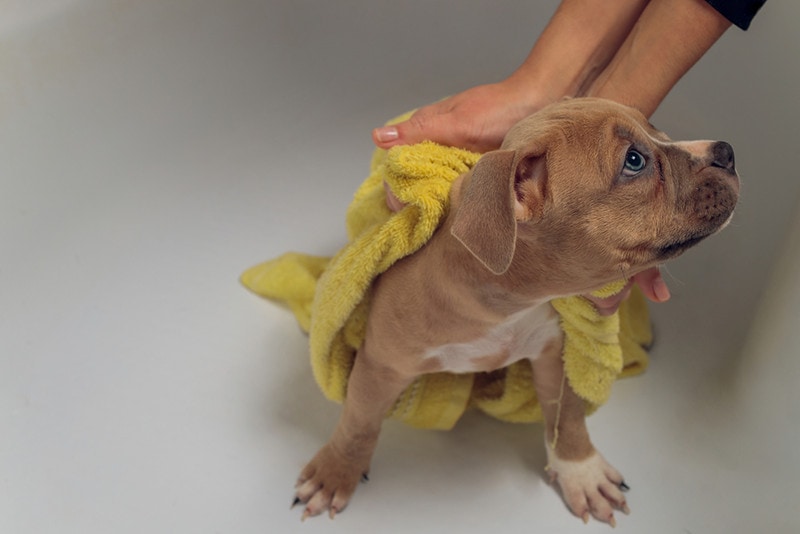How to Treat Pit Bull Skin Problems: 7 Vet-Approved Ways

Updated on

American Pit Bulls, which include breeds like Staffordshire Terriers and American Bulldogs, can suffer from various skin problems. These can be caused by skin infection, sunburns, food and environmental allergies, skin parasites, systemic illness, genetic conditions, and deficiencies in certain minerals.
The ideal treatment will depend on the underlying cause. Finding a suitable and effective treatment starts by determining the root cause of the problem. This is where your vet comes in. Let’s take a deeper look.
Identify the Cause of Skin Problems
Although Pit Bulls may suffer more commonly with skin problems, any breed can be affected. Bull Terriers are genetically predisposed to a very rare condition that can encourage dermatitis, erythema, flaking, and crusting, beginning around the eyes, mouth, and ears and spreading to genital area, anus, pads, elbows, and hocks. This condition is called zinc-responsive dermatosis and is fatal. Luckily, it seems like this disease has been mainly bred out, but it’s important to be aware of it if you own a Pit Bull breed.

Skin conditions are the visible face of zinc deficiency, but at the same time, it causes a host of other serious and life-threatening metabolic and health problems that need to be addressed urgently. In case of a genetic defect, which is luckily very rare these days, the illness is considered fatal.
The Top 7 Dog Skin Disease Management Options
If your dog is suffering from any skin issues, it’s crucial to get them checked by your veterinarian or a veterinary dermatologist. Skin complaints may be frustrating and challenging to diagnose, and it’s important that your vet starts the diagnostic process as soon as possible. Here are some of the steps and guidelines your vet will discuss with you, based on your dog’s signs and most likely underlying cause.
1. Veterinary Diagnostics
No matter what is happening with your dog’s skin or their general health, your vet will be able to help identify the underlying cause. They will recommend a diagnostic process in order to rule out various causes, from the most basic ones to the more challenging ones. Oftentimes, when it comes to skin issues, a diagnosis is based on exclusion. There are many tests your vet or a dermatologist can recommend in order to identify the issue and start appropriate treatment.
Your vet may prescribe systemic or topical treatment, and depending on the cause of skin issues, the treatment may be short term or may continue for a few years or for the rest of your dog’s life.
Above all, though, a vet can identify whether a skin complaint is a surface sign of a much deeper and more serious underlying problem.
The following six guidelines are just some of the possible veterinary recommendations if your dog’s skin issues are due to an allergic skin disease or a topical skin infection. These are purely adjunctive management options alongside the medical therapy prescribed by your vet, and on their own, depending on the underlying issue, are unlikely to be sufficient to manage the signs. It’s important not to self diagnose your pooch, as skin issues are complex, and you may waste valuable time while your dog’s skin condition is getting worse. This will cause pain and discomfort to your dog, reduce their quality of life, and may worsen the underlying systemic health condition, making it more expensive and time consuming to diagnose and treat. Consider pet insurance when getting a dog, as it may help alleviate some of the financial concerns.

2. Diet Trials
Your vet or veterinary dermatologist may recommend you change your dog’s diet if they suspect your dog is allergic to a certain ingredient in their food. If your dog has been eating food based on a beef protein, your vet may recommend a different protein, such as lamb or fish.
An elimination diet means starting out with a very basic food that does not include any known or suspected allergens. It’s necessary to feed such a diet for a minimum of 8-12 weeks, and your dog should not have any other food ingredients or treats at that time, as it will negatively impact the results. If your dog’s skin problems or digestive signs clear up, you could speak to your vet about gradually reintroducing ingredients until the problems start again, and then you can definitely identify the ingredients they’re allergic to.
3. Using Antibacterial Dog Shampoo
You should never use human shampoo on dogs, and you can get medicated and specific canine shampoo for use on dogs with allergies and skin complaints based on your vet’s recommendations.
Speak to your vet, as they may recommend a particular bathing frequency, like weekly, monthly, or fortnightly bathing. A lot of owners are concerned about bathing too often because they have heard that it strips the natural oils from a dog’s skin and may lead to skin disbalance. However, done properly and with the right shampoos for the right reasons, which in this case are skin conditions, it can help manage the complaint. Of course, speak to your vet first about how often this should occur.

4. Paw and Skin Fold Hygiene
Many environmental irritants are picked up while out on walks because you cannot control what is in the grass or on the floor. The same goes for dust mites and indoor allergens and contact irritants. Once your dog has these irritants on their paws, they will scratch and may transfer them onto other areas of the skin.
Try to keep the dust levels under control as much as possible, and keep your pooch’s beds and sleeping areas clean. However, such steps may certainly help but will have a limited effect, as it’s difficult to control these types of allergens present everywhere in the environment.
Consider wiping your dog’s paws when returning from outside using a wet towel, and then wash and dry the towel afterward. If your dog has any skin folds, make sure you are regularly checking them and cleaning them in the appropriate way, as they may also get infected and worsen your dog’s skin condition. If your veterinary dermatologist has diagnosed your dog with atopic dermatitis, they may recommend more specific instructions, depending on the identified allergens that are causing skin signs in your pooch.
5. Flea Prevention
Fleas are a major irritant, and even if the fleas themselves do not cause flea allergies in your dog, their itching and biting to eradicate the fleas can be contributing to the problem or even causing it to easily worsen.
Look for signs of fleas and apply regular flea treatment according to the instructions on the treatment package given by your veterinarian.
6. Introduce Fish Oil
Fish oil contains omega-3 fatty acids. These can play a key role in good health, immune system health, and they also encourage healthy eyes, skin, and coat. If your dog is suffering from skin issues, speak to your vet about adequate and recommended amounts of these compounds in their regular diet.
Some types of food, particularly those formulated with high-quality ingredients and intended for dogs with sensitive skin, already contain omega fatty acids. Too much of a good thing may also be harmful, and there are potential adverse effects if your dog is having a higher-than-recommended amount.
Ensure that the food you offer includes a reasonable amount, and add omega fish oils to their diet using veterinary-approved supplements, but only if your vet suggests doing so based on your dog’s medical history and their diet. It may not be indicated in dogs with diabetes, digestive issues, a clotting disorder, those on anticoagulant medication, or a history of pancreatitis. Fish oil should be used cautiously in pregnant or nursing dogs.

7. Home Management
If anybody has picked up any allergens on their shoes while out of the house, they will have settled on the floor. Alternatively, your dog could be allergic or sensitive to dust or even to the carpet fibers or rug itself.
Make sure you dust and vacuum regularly. Consider using an air filter to remove pollen and other potentially sensitive ingredients.

Conclusion
Pit Bull breeds can suffer with skin problems and skin complaints, like any other breed of dog. Although the tips above are geared towards Pit Bull breeds, they will apply to any breed in the hope of alleviating itching, biting, and other skin complaints with the professional help of your vet or a veterinary dermatologist.
Related Reads:
Featured Image Credit: Andy Gin, Shutterstock














